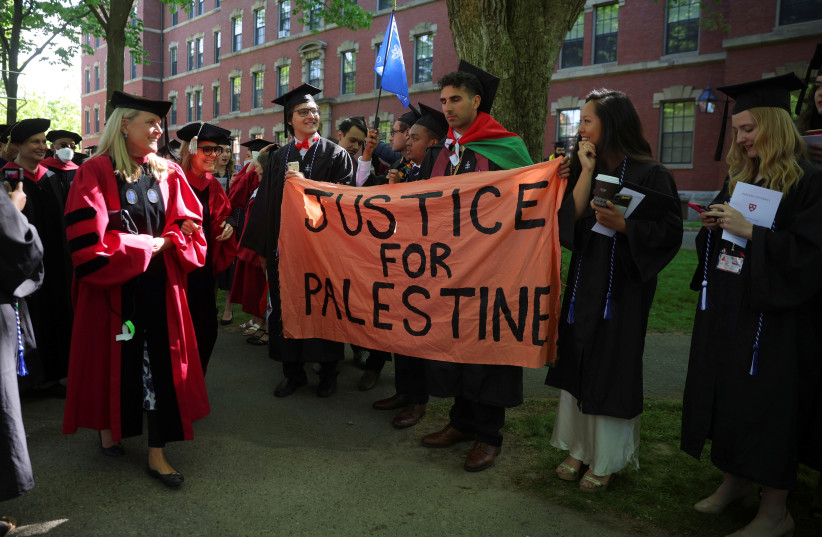Is your university facing a boycott, divestment, and sanction (BDS) resolution in student government targeting Israel?
Earlier this year, The Ohio State University grappled with a BDS referendum, and the outcome proved unprecedented.
About a month ago, students in the OSU Undergraduate Student Government (USG) heard that a group of anti-Israel students sought to place BDS on an annual campus-wide general election.
Students from Students for Justice in Palestine (SJP), an official student organization, and OSU Divest, an unofficial student organization, launched a concerted effort to petition 1,000 signatures to put BDS on the ballot.
Together with students from the Student Coalition for Accountable, Responsible, and Legitimate Elections Today (SCARLET), I submitted formal complaints to the USG judicial panel, highlighted several by-law infractions, and successfully nullified hundreds of petition signatures to guarantee BDS’s removal from the ballot, weeks before the election began.

Sunday night before the election, in a weak, spineless, and corrupt decision-making moment, the Judicial Panel reversed its previous ruling, confirming BDS on the ballot after significant pressure and a (late and, therefore, unlawful) appeal from SJP and OSUDivest. Voting began Monday at noon and was scheduled to end Wednesday at midnight.
The pro-Israel community mobilized and jumped into action. Student leaders rallied the community, crafted a strategy, and built an ongoing “war room” inside OSU Hillel. That same day, anti-BDS students tabled on the main Oval, built a social media campaign, and reached out to critical stakeholders in the community, including university administration and local politicians.
Early Tuesday morning, as the election was ongoing, the university administration pulled the BDS initiative from the ballot and communicated their intention to hold a “special hearing.” All parties, including SCARLET and SJP, could aptly present their case for the viability of a “special election” concerning, exclusively, BDS.
On Tuesday evening, SJP pugnaciously disrupted a private weekly USG meeting entirely unrelated to the election drama. Even further, SJP planned to speak at the USG General Assembly of senators during their public forum Wednesday night.
Supporters of Israel refused to idly stand by and allow slanderous attacks unabated, including false accusations of genocide, apartheid, and the new, 21st-century blood libel: colonization. For nearly four hours, SJP and the pro-Israel community exchanged narratives about the election turmoil, campus life, and the impact of the Israel-Hamas war, filibustering the General Assembly and inhibiting any tangible legislation from being passed.
Wednesday, the university administration inquired with the Ohio Attorney General concerning BDS, citing USG’s adherence to state law in which Ohio Revised Code Section 9.76 affirms that the university “may not divest wholesale its interests in Israeli assets. Further, the university may not adopt or adhere to a policy of refusing to deal with or otherwise limit commercial relations with Israel or with any persons or entities associated with it.” Pulled from the ballot altogether, BDS was resolutely defeated!
What strategic, repeatable, and implementable ingredients are needed to fight BDS and win?
The strategy to fight BDS in three steps
FIRST, THE pro-Israel community must establish positive working relationships with state and federal government officials. Constant updates on campus life concerning the pro-Israel community, including antisemitism, should be provided. Staffers, state senators, Congressional representatives, and those in the Governor’s office possess relationships with university administration and can exert external pressure on university policy.
SECOND, THE pro-Israel community, similar to its relationship with government officials, must invoke ongoing communication, education, and relationship-building with key decision-makers in university administration, including the Office of the President, Board of Trustees, and Student Life.
American universities are massive corporate bureaucratic organisms; if they are not growing and surviving, they are dying. They fear losing money, incurring lawsuits, and experiencing unfavorable press, staining their reputation and prompting organizational decline.
Playing on the interests and fears of the university administration to exert internal pressure, students and professional staff should work within the system. To be effective, it is necessary to scrupulously document all communications with the university administration and government officials.
THIRD, GRASSROOTS fighters can rally the pro-Israel community to mobilize around defeating BDS. Two types of student leaders can rally the community: students within Jewish organizations and those involved in other parts of campus life. Chabad and Hillel student board leaders can help inspire the Jewish community internally because they are a significant segment of the pro-Israel movement on campus.
Externally, pro-Israel student leaders connected to Greek life, Christian life, and middle/right-wing political groups can locate and persuade respected heads to join the cause. Anti-BDS leadership must develop a unified, compelling, and simple messaging campaign focused on why BDS hurts the university and a comprehensive outreach plan on whom, how, and why to target a person and/or organization. To start, “BDS is illegal, ill-intentioned, and irresponsible.”
Finally, with unrelenting efforts, investigation, and prudence, any campus can be turned into the right environment to defeat BDS.
Thirty-seven states have anti-BDS laws, including California and New York, which are home to some of the worst antisemitic campuses. Ohio State’s decision to remove BDS from the ballot by turning to state law, the first of its kind since October 7, 2023, sets a precedent for other schools to do the same.
Universities can thereby rid themselves of increased antisemitism, hostile and divisive environments, and the poor press that tends to arrive in tandem with BDS resolutions. Universities should not want BDS on their campus.
State law gives them the means and justification for scrapping BDS trash altogether.
In all likelihood, SJP will attempt to bring BDS to student governments across the country. Now is the time to prepare.
Heeding the wise words of military strategist Sun Tzu, “Every battle is won before it is ever fought.”
The writer is a senior at Ohio State University and president of OSU Hillel.
